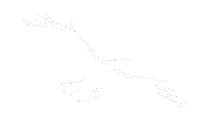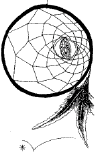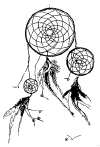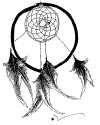The game, played as it was, by the young men of two different
tribes, became exciting, and the commandant of the fort even took his stand
outside of his open gates, to view its progress. His soldiers stood
carelessly unarmed, here and there, intermingling with the Indian women, who
gradually huddled near the gateway, carrying under their blankets the
weapons, which were to be used in the approaching work of death.
In the struggle for its possession, the ball at last was
gradually carried towards the open gates, and all at once, after having
reached a proper distance, an athletic arm caught it up in his bat, and as
if by accident threw it within the precincts of the fort. With one deafening
yell and impulse, the players rushed forward in a body, as if to regain it,
but as they reached their women and entered the gateway, they threw down
their wooden bats and grasping the shortened guns, tomahawks, and knives,
the massacre commenced, and the bodies of the unsuspecting British soldiers
soon lay strewn about, lifeless, horribly mangled, and scalpless. The
careless commander was taken captive without a struggle, as he stood outside
the fort, viewing the game, which the Ojibway chieftain had got up for his
amusement.
The above is the account, much briefened, which I have
learned verbally from the old French traders and half-breeds, who learned it
from the lips of those who were present and witnessed the bloody
transaction. Not a hair on the head of the many Frenchmen who witnessed this
scene was hurt by the infuriated savages, and there stands not on record a
stronger proof of the love borne them by the tribe engaged in this business
than this very fact, for the passions of an Indian warrior, once aroused by
a scene of this nature, are not easily appeased, and generally everything
kindred in any manner to his foe, falls a victim to satiate his
blood-thirsty propensities.
Alexander Henry, one of the few British traders who
survived this massacre, gives the most authentic record of this event that
has been published, and to his truthful narrative I am indebted for much
corroborating testimony, to the more disconnected accounts of the Indians
and old traders. A few quotations from his journal will illustrate the
affair more fully, and I have no doubt will be acceptable to the reader, as
being better told than I can tell it.
After disregarding the friendly cautionary hints of
Wa-wat-am, an Ojibway Indian who had adopted him as a brother, but who dared
not altogether disclose the plan of attack formed by his people, Mr. Henry
resumes his narrative as follows:--
"The morning was sultry. A Chippeway came to tell me that his nation was
going to play at Baggatiway with the Sacs or Saukies, another Indian nation,
for a high wager. He invited me to witness the sport, adding that the
commandant was to be there, and would bet on the side of the Chippeways. In
consequence of this information, I went to the commandant and expostulated
with him a little, representing that the Indians might possibly have some
sinister end in view, but the commandant only smiled at my suspicions....
"I did not go myself to see the match, which was now to be
played without the fort, because, there being a canoe prepared to depart on
the following day to Montreal, I employed myself in writing letters to my
friends; and even when a fellow trader, Mr. Tracy, happened to call on me,
swing that another canoe had just arrived from Detroit, and proposing that I
should go with him to the beach to inquire the news, it so happened that I
still remained to finish my letters, promising to follow Mr. Tracy in the
course of a few minutes. Mr. Tracy had not gone more than twenty paces from
the door, when I heard an Indian war cry and a noise of general confusion.
Going instantly to my window, I saw a crowd of Indians within the fort,
furiously cutting down and scalping every Englishman they found. In
particular, I witnessed the fate of Lieut. Jenette.
I had, in the room in which I was, a fowling piece, loaded
with swan shot. This I immediately seized, and held it for a few minutes,
waiting to hear the drum beat to arms. In this dreadful interval, I saw
several of my countrymen fall, and more than one struggling between the
knees of an Indian, who, holding him in this manner, scalped him while yet
living! At length, disappointed in the hope of seeing resistance made to the
enemy, and sensible of course that no effort of my own unassisted arm could
avail against four hundred Indians, I thought only of seeking shelter. Amid
the slaughter, which was raging, I observed many of the Canadian inhabitants
of the fort calmly looking on, neither opposing the Indians nor suffering
injury. From this circumstance I conceived a hope of finding security in
their houses."
After describing the many hair-breadth escapes which
befell him at the hands of the savages, Mr. Henry was eventually saved by
Wa-wat-am, or Wow-yat-ton (Whirling Eddy), his adopted Ojibway brother, in
the following characteristic manner, which we will introduce in his own
words, as an apt illustration of Indian custom: --
"Toward noon (7th June), when the Great War chief, in company with
Wen-ni-way, was seated at the opposite end of the lodge, my friend and
brother Wa-wa-tam, suddenly came in. During the four days preceding, I had
often wondered what had become of him. In passing by, he gave me his hand,
but went immediately toward the great chief, by the side of whom, and
Wen-ni-way, he sat himself down. The most uninterrupted silence prevailed.
Each smoked his pipe, and this done, Wa-wa-tam arose and left the lodge,
saying to me, as he passed, 'Take courage.'
"An hour elapsed, during which several chiefs entered, and
preparations appeared to be making for a council. At length Wa-wa-tam
re-entered the lodge, followed by his wife, and both loaded with
merchandise, which they carried up to the chiefs, and laid in a heap before
them. Some moments of silence followed. at the end of which, Wa-wa-tam
pronounced a speech, every word of which, to me, was of extraordinary
interest:--
"'Friends and relations,' he began,' what is it that I shall say? You know
what I feel. You all have friends and brothers and children, whom as
yourselves you love, and you, what would you experience, did you, like me,
behold your dearest friend, your brother, in the condition of a slave--a
slave exposed every moment to insult, and to the menaces of death! This
case, as you all know, is mine. See there,' pointing to myself, 'my friend
and brother among slaves, himself a slave!
"' You all well know, long before the war began,I adopted
him as my brother. From this moment he became one of my family, so that no
change of circumstances could break the cord which fastened us together. He
is my brother-and because I am your relation, he is therefore your relation
too; and how, being your relation, can he be your slave?
"'On the day on which the war began, you were fearful,
lest, on this very account, I should reveal your secret. You requested,
therefore, that I should leave the fort, and even cross the lake. I did so,
but did it with reluctance. I did it with reluctance, notwithstanding that
you, Mih-neh-wehna, who had the command in this enterprise, gave me your
promise that you would protect my friend, delivering him from all danger,
and giving him safely to me.
"'The performance of this promise I now claim. I come not
with empty hands to ask. You, Mih-neh-weh-na, best know whether or not, as
it respects yourself, you have kept your word. But I bring these goods, to
buy off every claim, which any man among you all may have on my brother, as
his prisoner.'
Wa-wa-tam having ceased, the pipes were again filled, and
after they were finished, a further period of silence followed. At the end
of this, Mih-neh-weh-na arose and gave his reply: --
"'My relation and brother,' said he, 'what you have spoken is the truth. We
were acquainted with the friendship, which subsisted between yourself and
the Englishman, in whose behalf you have now addressed us. We knew the
danger of having our secret discovered, and the consequences, which must
follow. You say truly that we requested you to leave the fort. This we did
in regard for you and your family; for if a discovery of our design had been
made, you would have been blamed, whether guilty or not, and you would thus
have been involved in difficulties, from which you could not have extricated
yourself. It is also true that I promised you to take care of your friend;
and this promise I performed by desiring my son, at the moment of assault,
to seek him out, and bring him to my lodge. He went accordingly, but could
not find him. The day after I sent him to Langlade's (a French trader), when
he was informed that your friend was safe; and had it not been that the
Indians were then drinking the rum which had been found in the fort, he
would have brought him home with him, according to my orders. I am very glad
to find that your friend has escaped. We accept your present: and you may
take him home with you.'
"Wa-wa-tam thanked the assembled chiefs, and taking me by
the hand, led me to his lodge, which was at the distance of a few yards only
from the prison lodge. My entrance appeared to give joy to the whole family.
Food was immediately prepared for me, and I now ate the first hearty meal,
which I had made since my capture. I found myself one of the family, and but
that I had still my fears as to the other Indians, I felt as happy as the
situation could allow."
Mr. Henry says further: "Of the English traders that fell
into the hands of the Indians at the capture of the fort, Mr. Tracy was the
only one who lost his life. Mr. Ezekiel Solomons, and Mr. Henry Bostwick,
were taken by the Ottawas, and, after the peace, carried down to Montreal,
and there ransomed. Of ninety troops, about seventy were killed; the rest,
together with those of the posts in the Bay des Puants (Green Bay) and at
the river St. Joseph, were also kept in safety by the Ottawas till the
peace, and then either freely restored, or ransomed at Montreal. The Ottawas
never overcame their disgust at the neglect with which they had been treated
in the beginning of the war, by those who afterwards desired their
assistance as allies."
That portion of the Ojibways, forming by far the main body
of the tribe who occupied the area of Lake Superior, and those bands who had
already formed villages on the Upper Mississippi, and on the sources of its
principal northeastern tributaries, were not engaged in the bloody
transactions which we have described or at most, but very few of their old
warriors, who have now all paid the last debt of nature, were noted as
having been present on the occasion of this most important event in Ojibway
history.
go to chapter 17
1
- 2
- 3
- 4
- 5
- 6
- 7
- 8
- 9
- 10
11
- 12
- 13
- 14
- 15
- 16
- 17
- 18
- 19
- 20
21
- 22
- 23
- 24
- 25 - 26 - 27 - 28 - 29 - 30
White Eagle Soaring: Dream Dancer of the 7th Fire






 Get
a course to promote your business online, explode your sales
Get
a course to promote your business online, explode your sales Get
software to promote your business online in less time
Get
software to promote your business online in less time Get
software to streamline your business and run it hands free.
Get
software to streamline your business and run it hands free.